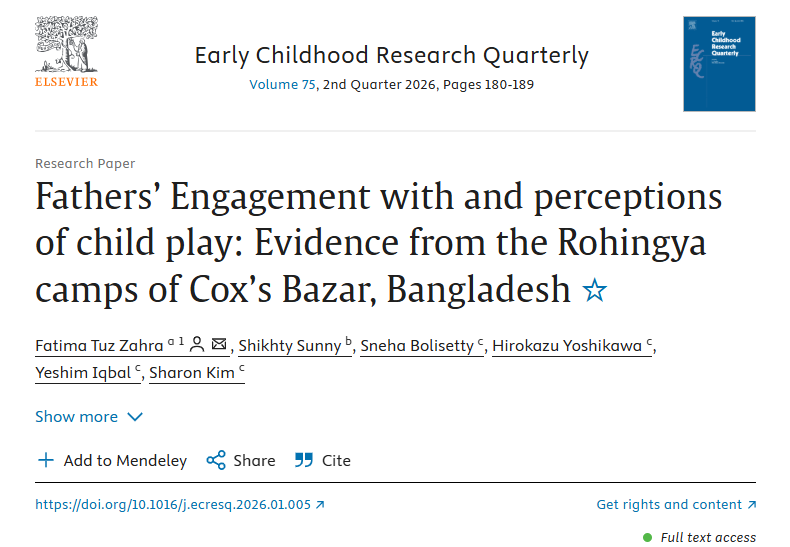Resources
The Play to Learn team has published a paper on Fathers’ Engagement with and perceptions of child play: Evidence from the Rohingya camps
Research on father engagement is heavily focused on Western families. Western-based programs to support fathers often do so in an individualistic manner, failing to address cultures in places where collective care is common. Limited existing research on fathers’ involvement in play emphasizes the influence of income and working status on fathers’ views on play. Overall, there is very little research on fathers' perceptions of play in refugee contexts, and there is no extensive study exploring this topic in the Rohingya context. In this context of forced displacement, we ask the following research question about the Rohingya fathers' perceptions of play.
Research Question:
How do fathers perceive children’s play in both structured (Humanitarian Play Labs) as well as unstructured (home and surrounding areas) play settings in the Rohingya camps in Cox’s Bazar, Bangladesh?
Developing and Implementing a Measure of Quality of Home Visit Interactions for Fathers: the Rohingya Camps and Host Communities in Cox’s Bazar, Bangladesh
As part of the Play to Learn initiative, with funding from the LEGO foundation, BRAC and Sesame Workshop designed a 6-month fathers’ engagement component to be added to an existing parenting intervention for mothers. The program was developed for fathers of children aged 0-3 in the Rohingya camps and surrounding host communities in Cox’s Bazar, Bangladesh, and focuses on mental health, responsive caregiving, and engagement with family. As part of an impact evaluation of the intervention1, we at Global TIES, New York University, developed an instrument to measure the quality of the intervention delivery.
This brief discusses the importance of measuring quality, the process of developing and implementing this quality instrument, and the preliminary analysis of data collected using it. In addition to informing the impact evaluation, a broader goal of this work is to contribute to the emerging knowledge on measuring program quality and fidelity, particularly in low and middle income countries (LMIC) and emergency contexts, and better understand “how” and “why” parenting programs in these contexts do or do not work.
Community Engagement for Early Childhood Development (ECD) Programs: Perspectives of the Rohingya and Other Stakeholders in Cox’s Bazar
Since its inception, partners of the LEGO Foundation-funded Play to Learn project have prioritized co-construction and community engagement1, 2 in designing and running programs that target children and caregivers in Bangladesh affected by the Rohingya displacement crisis. This includes the Humanitarian Play Labs (HPLs), a flagship program of BRAC, one of the main humanitarian partners implementing early childhood development (ECD) activities under Play to Learn. Given the emphasis and importance placed on community engagement in the HPL set-up and operations, Global TIES for Children at NYU, as the main research partner of the project, conducted a specific study to better understand the myriad ways in which community engagement happened around the HPLs and was perceived by the community. The study team, which included project partners and our data collection partner, Arced Foundation, was particularly interested in how participating community members experienced and understood these programs and how they would like to be engaged to sustain them beyond the lifetime of the six-year Play to Learn project.
In conducting this research, the study team deliberately employed participatory research approaches that themselves relied on community engagement as a key strategy for generating specific research questions (related to the study’s focus areas), collecting data, and interpreting community input. This brief discusses the importance of participatory research, the process of running a participatory workshop, and reflections on how the data generated is of particular value to humanitarian implementers. In addition to informing program delivery, a broader goal of this work is to contribute to understanding both the “how” of participatory research methods (what goes into them, how they can be organized) and the “why” behind them (the benefits of multi-method approaches and community engagement as key research strategies).
বাংলাদেশের কক্সবাজারের রোহিঙ্গা ক্যাম্প এবং হোস্ট কমিউনিটিতে ফাদার এনগেজমেন্ট মডেলের প্রভাব: একটি র্যান্ডোমাইজড কন্ট্রোল (Randomized Control) ট্রায়াল
This study is a causal impact evaluation of Watch, Play, Learn (WPL), a program by Sesame Workshop that consists of videos that aim to bring playful early learning opportunities to children, especially those affected by conflict and crisis, via mobile phones. This study focused on the effects of WPL math and social-emotional skills content delivered to Venezuelan migrants and Colombian children living in communities in Colombia where families and children face challenges in accessing essential services, including early education. Implementation was led by the Colombia office of Innovations for Poverty Action.
Effects of a Father Engagement Model in Rohingya Camps and Host Communities in Cox’s Bazar, Bangladesh: A Randomized Controlled Trial
This study is a causal impact evaluation of Watch, Play, Learn (WPL), a program by Sesame Workshop that consists of videos that aim to bring playful early learning opportunities to children, especially those affected by conflict and crisis, via mobile phones. This study focused on the effects of WPL math and social-emotional skills content delivered to Venezuelan migrants and Colombian children living in communities in Colombia where families and children face challenges in accessing essential services, including early education. Implementation was led by the Colombia office of Innovations for Poverty Action.
Fathers' Perceptions of Play: Evidence From the Rohingya Camps Research Brief
This first brief in the NYU Global TIES for Children (NYU-TIES) series presents preliminary findings collected as part of the pre-pilot and pilot phases of one of their Play to Learn impact evaluations and a longitudinal study. The impact evaluation, led by NYU-TIES, investigates BRAC's flexible, hybrid home-visiting program in Cox’s Bazar which seeks to engage fathers as well as mothers and the longitudinal study features three-cohorts from prenatal and birth which follow young Rohingya children through their first years of life. The data in this brief looks specifically at Rohingya fathers’ perceptions of play.
What Do Fathers Think of Play? Rohingya Fathers' Perceptions of Play in Cox's Bazar
Global TIES for Children is excited to share some initial results from preliminary research concerning fathers’ involvement in children’s development in Rohingya refugee communities in Cox’s Bazar, Bangladesh. The research was conducted as part of the LEGO foundation-funded Play to Learn project, a partnership between Sesame Workshop, BRAC, the International Rescue Committee (IRC), and TIES to provide and understand a range of early child development services for these communities. NYU’s research unearths.
Image credit: Ante Hamersmit (@ante_kante on Unsplash)
Family Socialization and Experiences of Early Childhood Programs in the Rohingya Camps: Study Protocol
Image credit: Van Tay Media (@vantaymedia on Unsplash)








